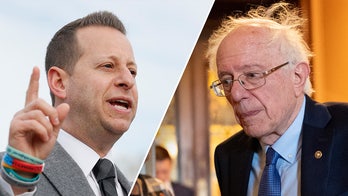
Sen. Marco Rubio, R-Fla. (AP)
When going down the check-list of desirable vice presidential qualities, those who talk up Florida Sen. Marco Rubio note that he is telegenic, charismatic, smart and a darling of conservatives, all things that some believe Mitt Romney would need to boost his appeal.
And what nearly always is stressed as Rubio’s greatest ace is that he is a Latino from Florida --an ethnic group, and a state, seen as crucial to a November victory for Romney, the presumptive GOP presidential nominee.
But a debate is raging among Latinos about Rubio.
One side says he is no true representative of Latinos because he opposes liberal immigration measures that the vast majority in the ethnic group support. The other side says Latinos are not a monolith, and that Rubio, and other minority candidates, should not be seen as traitors, or unrepresentative, when they hold conservative views.
“We think it’s childish to single out Marco Rubio [for his views] because he’s Latino,” said Bob Quasius, president of Café Con Leche Republicans, a group that says it favors moderate immigration policies. “Minority and women Republicans tend to be more harshly criticized.”
Florida-based critics of Rubio set up a website called “Wrong Way Rubio.” The site claims it is “dedicated to shining a spotlight on Sen. Rubio’s extremist positions.”
Presente.org, a Hispanic advocacy organization, has been very vocal in its criticism of Rubio – and formed a campaign called “No Somos Rubios” (“We Are Not Rubios”).
Cafe Con Leche sent an open letter to Presente.org telling it to back off Rubio.
“They’re framing him as an extremist, an extremist [particularly] on immigration,” Quasius said. “They want Latinos to stay on the liberal hacienda.”
The letter to Presente.org said: "Perhaps the Democratic Party can begin issuing gold stars to minority members of the House and Senate who satisfy their criteria for being 'black enough,' 'Hispanic enough,' or 'Women enough.'"
Roberto Lovato, co-founder of Presente.org, said that Rubio – and other Latinos who rise to political prominence – must be scrutinized, particularly when they are trotted out to Latino voters as one of their own.
“Marco Rubio merits serious attention because there’s all this talk about his delivering the ‘Latino vote,’ and most Latinos don’t know him,” Lovato said. “We saw a threat posed by a very articulate, and smart, and good-looking Marco Rubio, who’s being touted as possibly running in the presidential election. It would be an earth-shaking event in Latino politics.”
Rubio appeals to conservatives and is often described as a Tea Party favorite.
On issues watched by many Latino voters, Rubio has taken a decided hard line.
He opposes immigration reform measures that would not first secure the border and more strictly enforce the laws already in place. He supports English as the country’s official language, and has praised Arizona’s controversial immigration enforcement law, which is scheduled to come before the U.S. Supreme Court on April 25.
He has also, however, cautioned Republicans to watch their rhetoric on immigration – particularly their unsympathetic tone on what to do with the undocumented – and has urged them instead to shift their focus to legal immigration when discussing the issue.
He recently said he favored a restricted version of the DREAM Act that would grant a conditional type of legal status –but not open a path to citizenship- to the children of undocumented immigrants. Details of the plan have not been made public.
Immigration hardliners slammed Rubio's plan, calling it "amnesty."
Those who favor a broader DREAM Act --which would provide undocumented children brought to the United States as minors a path to legalization as long as they attend college or serve in the military, among other things-- say Rubio's version would relegate these youths to a permanent second-class status.
“His record is as anti-immigrant as it gets,” Lovato said. “Marco Rubio is this strange and unique political mutation -- an anti-immigrant son of immigrants.”
Rubio opposed Obama's Supreme Court nomination of Sonia Sotomayor, who is of Puerto Rican descent, and blocked the confirmation of Mari Carmen Aponte, who is also Puerto Rican, as ambassador to El Salvador.
His opposition to the Latina nominees prompted Senate Majority Leader Harry Reid, a Democrat, to say: "In Nevada, this woman (Aponte) is seen by the Puerto Rican community, the Hispanic community, as really somebody who is an up-and-rising star."
"I just think it’s a mistake for someone who is supposedly representing Hispanic issues to do what (Rubio) has done," said Reid.
Other high-profile Latino Republicans also support conservative immigration policies. Nevada Gov. Brian Sandoval spoke in favor of Arizona's immigration law when he ran for office in 2010, and said he was against driver's licenses for undocumented immigrants.
New Mexico Gov. Susana Martínez opposes driving privileges for undocumented immigrants.
Defenders of Rubio say neither he nor the others should be required to march in lockstep with those who support liberal policies because of their ethnicity.
They say Rubio, in particular, has made efforts to find workable solutions --those that would stand a chance of getting bipartisan support in Congress-- to immigration problems. Other GOP leaders who are far less flexible on issues of importance to Latinos are not getting anywhere near the scrutiny that Rubio is receiving, they argue.
"We do not have a problem with Presente or, for that matter, anyone else challenging members of the GOP to do something about our broken immigration system," said Manny Fernández of Cafe Con Leche. "On the other hand we do have a problem with Presente singling out Rubio for special criticism because he is Hispanic, especially given that he is not an extremist an extremist on the issue."
"Rubio questioned the wisdom of the original draft of SB 1070 and only supported that bill after he was satisfied that the revised draft contained appropriate protections against racial profiling," Fernández said. "He has acknowledged the need for legislation to fix our broken immigration system and referred to a group of Dreamers who heckled him at a recent conference as brave young men and women whose voices should be heard."
On Monday, the Republican National Committee announced plans to aggressively pursue Latino voters, with a concentrated effort in six states, including Florida. On Wednesday, the Obama campaign announced its own campaign targeting Latino voters.
Latino eligible voters number more than 20 million. They have proven they’re in no party’s pocket – they gave Barack Obama nearly 70 percent of their support in 2008, compared to about 30 percent for his GOP challenger, Sen. John McCain. But about 44 percent voted for George W. Bush in 2004 when he ran against Al Gore.
Still, Democrats maintain a significant political advantage with Latinos, numbers that were only strengthened by the harsh rhetoric from Republican presidential candidates in this year's primary.
A Fox News Latino poll this year showed President Obama leading Romney among Latino likely voters by 70 percent to 14 percent. A Pew Research Center survey out Tuesday showed Obama with a solid edge over Romney among Hispanic registered voters, 67-27 percent.
If he becomes the nominee, Romney, who during the GOP primary embraced hard-line immigration positions, needs to do better than get 40 percent of the Hispanic vote, political experts say, if he is to win the election.
Some Republicans have expressed concern that Romney has alienated Latino voters with positions that oppose opportunities for undocumented immigrants to legalize their status, and that support tough policies that, as he has put it, would encourage people to “self-deport.” He called Arizona’s immigration law, which criminalizes being in the country illegally, a model for the nation.
But at a recent private fundraiser, Romney was heard saying “We have to get Hispanic voters to vote for our party," according to published reports.
Romney warned that a significant number of Hispanics backing Obama "spells doom for us," according to NBC News.
Lovato, and other Latino critics of Rubio, maintain that he must be held to a higher standard than other political figures, but he rejects the idea that Presente targets only Latino conservatives, as others charge.
Lovato said his organization has also taken Obama's director of domestic policy, Cecilia Muñoz, to task for defending some of the president's controversial immigration policies.
Presente.org's website says: "As the former vice president at the National Council of La Raza, Ms. Muñoz used to be a champion for immigrant rights. Now she is the main defender of failed programs. . .that are responsible for the inhumane incarceration of hundreds of thousands of immigrants."
"We hold powerful Latinos and Latinas accountable for their statements and actions," Lovato said. "We launched to be an organization for accountability for the Latino community."
Nor is Obama spared, either.
Presente.org has assailed the president for not doing more to advance comprehensive immigration reform.
"Rubio and the GOP have learned from Obama and the Democrats to manipulate immigrant fear," Lovato said. "Obama hasn't used his power and influence to advance the DREAM Act, and he has expanded Secure Communities," he added, referring to a controversial federal immigration enforcement program.
Follow Elizabeth Llorente on Twitter: @Liz_Llorente
Elizabeth Llorente can be reached elizabeth.llorente@foxnewslatino.com
Follow us on twitter.com/foxnewslatino
Like us at facebook.com/foxnewslatino




